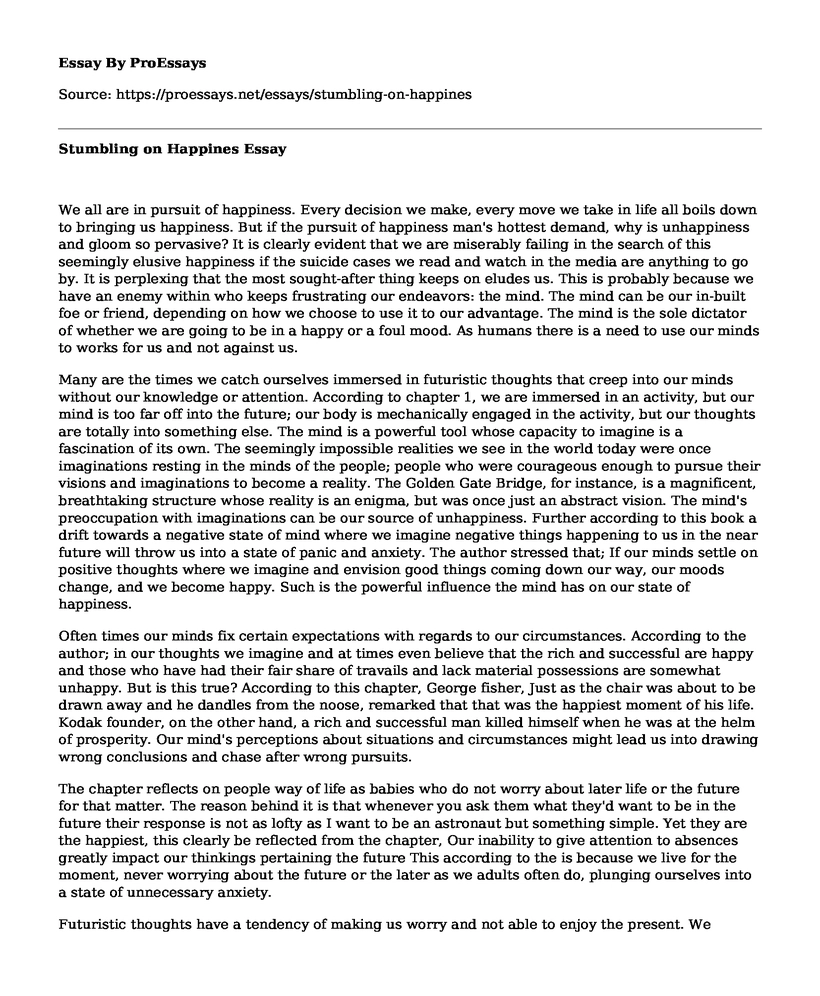We all are in pursuit of happiness. Every decision we make, every move we take in life all boils down to bringing us happiness. But if the pursuit of happiness man's hottest demand, why is unhappiness and gloom so pervasive? It is clearly evident that we are miserably failing in the search of this seemingly elusive happiness if the suicide cases we read and watch in the media are anything to go by. It is perplexing that the most sought-after thing keeps on eludes us. This is probably because we have an enemy within who keeps frustrating our endeavors: the mind. The mind can be our in-built foe or friend, depending on how we choose to use it to our advantage. The mind is the sole dictator of whether we are going to be in a happy or a foul mood. As humans there is a need to use our minds to works for us and not against us.
Many are the times we catch ourselves immersed in futuristic thoughts that creep into our minds without our knowledge or attention. According to chapter 1, we are immersed in an activity, but our mind is too far off into the future; our body is mechanically engaged in the activity, but our thoughts are totally into something else. The mind is a powerful tool whose capacity to imagine is a fascination of its own. The seemingly impossible realities we see in the world today were once imaginations resting in the minds of the people; people who were courageous enough to pursue their visions and imaginations to become a reality. The Golden Gate Bridge, for instance, is a magnificent, breathtaking structure whose reality is an enigma, but was once just an abstract vision. The mind's preoccupation with imaginations can be our source of unhappiness. Further according to this book a drift towards a negative state of mind where we imagine negative things happening to us in the near future will throw us into a state of panic and anxiety. The author stressed that; If our minds settle on positive thoughts where we imagine and envision good things coming down our way, our moods change, and we become happy. Such is the powerful influence the mind has on our state of happiness.
Often times our minds fix certain expectations with regards to our circumstances. According to the author; in our thoughts we imagine and at times even believe that the rich and successful are happy and those who have had their fair share of travails and lack material possessions are somewhat unhappy. But is this true? According to this chapter, George fisher, Just as the chair was about to be drawn away and he dandles from the noose, remarked that that was the happiest moment of his life. Kodak founder, on the other hand, a rich and successful man killed himself when he was at the helm of prosperity. Our mind's perceptions about situations and circumstances might lead us into drawing wrong conclusions and chase after wrong pursuits.
The chapter reflects on people way of life as babies who do not worry about later life or the future for that matter. The reason behind it is that whenever you ask them what they'd want to be in the future their response is not as lofty as I want to be an astronaut but something simple. Yet they are the happiest, this clearly be reflected from the chapter, Our inability to give attention to absences greatly impact our thinkings pertaining the future This according to the is because we live for the moment, never worrying about the future or the later as we adults often do, plunging ourselves into a state of unnecessary anxiety.
Futuristic thoughts have a tendency of making us worry and not able to enjoy the present. We become unhappy at the thoughts of something bad happening to us tomorrow or some few hours from now, some of which might not even happen after all. Our minds have a tendency of projecting into the future, drawing us with it; we are constantly living in the future in our minds. The present is totally forgotten, so is happiness. To be happy, we need to contain our minds not to drift into negative, anxious thoughts about the future.
Reference
Gilbert, D. (2006). Stumbling on happiness. New York: A.A. Knopf.
Cite this page
Stumbling on Happines. (2021, Mar 13). Retrieved from https://proessays.net/essays/stumbling-on-happines
If you are the original author of this essay and no longer wish to have it published on the ProEssays website, please click below to request its removal:
- Exhibitionism, Voyeurism, and Our Sexual Behavior
- Hume's Moral Philosophy - Essay Example
- Paper Example on Unique Characteristics of Schizophrenia
- Essay Sample on Post-Traumatic Stress in Children and Adolescents Exposed to Domestic Violence
- ADHD Prevalence: Higher in Some Countries Than Others - Essay Sample
- Essay on Adolescent and Young Adult Addiction: Impact of Age on Human Behavior
- Psychological Risks and Resilience in Children and Adolescents - Essay Sample







